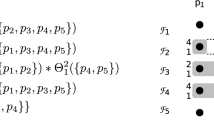Abstract
An epidemic model gives an efficient approach for transaction processing of replication systems in weakly connected environments. The approach has the advantages of high adaptation, support for low-bandwidth network, and committing updates in an entirely decentralized control fashion. But the previous implementing protocols, like ROWA protocol, quorum protocol, and voting protocol, have a common shortcoming that they are pessimistic in conflict reconciliation, therefore bring high transaction abort rate and reduce system performance dramatically when the workload scales up. In this paper, an optimistic voting protocol, which introducescondition vote andorder vote in the voting process of transactions, is proposed. Thecondition vote andorder vote postpone the final decision on conflicting transactions and avoid transaction aborts that are incurred by read-write and write-write conflicts. Experimental results indicate that the optimistic voting protocol decreases abort rate and improves average response time of transactions markedly when compared to other protocols.
Similar content being viewed by others
Explore related subjects
Discover the latest articles, news and stories from top researchers in related subjects.References
Lin Huaizhong, Chen Chun. An agent-based approach of transaction processing in mobile environments. InProceedings of 6th International Conference for Young Computer Scientists, Hangzhou, China, 2001, pp. 299–303.
Gray J, Helland P, O’Neil P, Shasha D. The dangers of replication and a solution. InProceedings of ACM SIGMOD International Conference on Management of Data, Montreal, Canada, 1996, pp. 173–182.
Anderson T, Breitbart Y, Korth H F, Wool A. Replication, consistency, and practicality: Are these mutually exclusive? InProceedings of ACM SIGMOD International Conference on the Management of Data, Seattle, Washington, 1998, pp. 484–495.
Agrawal D, Abbadi A El, Steinke R. Epidemic algorithms in replicated databases. InProceedings of 16th ACM SIGACT-SIGMOD-SIGART Symposium on Principles of Database Systems, Tucson, Arizona, 1997, pp. 161–172.
Holliday J, Steinke R, Agrawal D, Abbadi A El. Epidemic quorums for managing replicated data. InProceedings of 19th IEEE International Performance, Computing, and Communications Conference, Phoenix, Arizona, 2000, pp. 93–100.
Petersen K, Spreitzer M J, Terry D Bet al. Flexible update propagation for weakly consistent replication. InProceedings of 16th ACM Symposium on Operating System Principles, St. Malo, France, 1997, pp.288–301.
Cetintemel U, Keleher P J, Franklin M J. Support for speculative update propagation and mobility in Deno InProceedings of 21st International Conference on Distributed Computing Systems, Phoenix, Arizona: IEEE Computer Society Press, 2001, pp. 509–516.
çetintemel U, Keleher P. Light-weight currency management mechanisms in Deno. InProceedings of 10th International Workshop on Research Issues in Data Engineering, San Diego, California: IEEE Computer Society Press, 2000, pp. 17–24.
Deris M M, Mamat A, Hamzah M P. Replicated data management for transactions sharing in distributed database. InProceedings of 4th International Conference/Exhibition on High Performance Computing in Asia-Pacific Region, Beijing, China: IEEE Computer Society Press, 2000, pp. 836–841.
Lee Kyuwoong, Park S. Classification of weak correctness criteria for real-time database applications. InProceedings of 20th Annual International Computer Software and Applications Conference, Seoul, Korea: IEEE Computer Society Press, 1996, pp. 199–204.
Kemme B, Pedone F, Alonso G, Schiper A. Processing transactions over optimistic atomic broadcast protocols. InProceedings of 19th International Conference on Distributed computing Systems, Austin, Texas: IEEE Computer Society Press, 1999, pp. 424–431.
Sarin S K, Lynch N A. Discarding obsolete information in a replicated database system.IEEE Transactions on Software Engineering, 1987, 13(1): 39–47.
Venkalah D, Jalote P. An integer programming approach for assigning votes in a distributed system. InProceedings of 14th Symposium on Reliable Distributed Systems, Bad Neuenahr, Germany: IEEE Computer Society Press, 1995, pp. 128–134.
Holliday J, Agrawal D, Abbadi A El. Exploiting planned disconnections in mobile environments. InProceedings of 10th International Workshop on Research Issues in Data Engineering, San Diego, California: IEEE Computer Society Press, 2000, pp. 25–30.
Keleher P J. Decentralized replicated object protocols. InProceedings of 18th Annual ACM Symposium on Principles of Distributed Computing, Atlanta, Georgia, 1999, pp. 143–151.
Author information
Authors and Affiliations
Corresponding author
Additional information
This research is supported by the National Natural Science Foundation of China (Grant No. 69773018).
LIN Huaizhong was born in 1970. He received the B.S. degree from Department of Mathematics, Fudan University in 1991, and the M.E. degree from Department of Computer Science and Engineering, Shanghai Jiaotong University in 1994. Now he is a Ph.D. candidate in Department of Computer Science and Engineering, Zhejiang University. His research interests include mobile computing and distributed database.
CHEN Chun was born in 1955. Now he is a professor and Ph.D. supervisor in the Department of Computer Science and Engineering. Zhejiang University. His research interests include software engineering, computer graphics, CAD/CAM, artificial Intelligence, and mobile computing.
Rights and permissions
About this article
Cite this article
Lin, H., Chen, C. Optimistic voting for managing replicated data. J. Compt. Sci. & Technol. 17, 874–881 (2002). https://doi.org/10.1007/BF02960779
Received:
Revised:
Issue Date:
DOI: https://doi.org/10.1007/BF02960779




